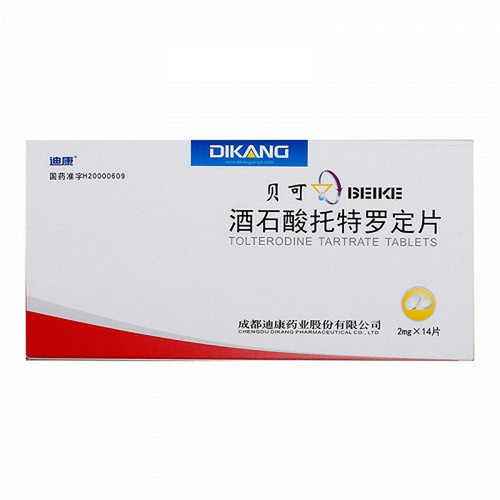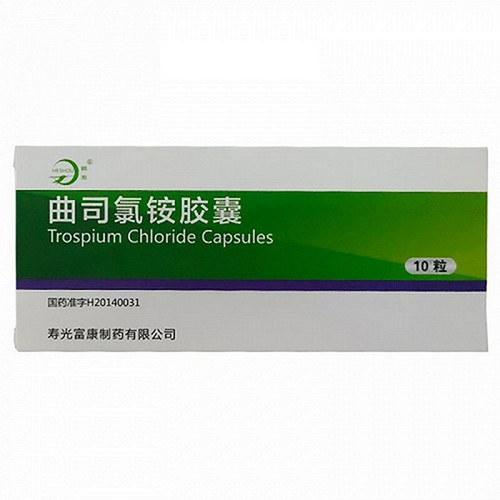Product Overview
[Drug Name]
Generic Name: Tolterodine Tartrate Capsules
Trade Name: MeiPeng Tolterodine Tartrate Capsules 2mg*12 Capsules
Pinyin Full Code: MeiPeng JiuShiSuanTuoTeLuoDingJiaoNang 2mg*12Li
[Main Ingredient]
Tolterodine tartrate.
[Properties]
This product is a hard capsule containing white powder and granules.
[Indications/Main Functions]
This product is indicated for the treatment of urinary frequency, urgency, or urge incontinence due to overactive bladder.
[Specifications]
2mg*12 Capsules
[Dosage and Administration]
The recommended initial dose is 2mg (1 capsule) twice daily. Depending on the patient's response and tolerance, the dose can be reduced to 1mg (half a capsule) twice daily. For patients with hepatic impairment or those taking CYP3A4 inhibitors (see Drug Interactions), the recommended dose is 1mg (half a capsule) twice daily.
[Adverse Reactions]
The side effects of this drug are generally well tolerated and disappear after discontinuation.
This drug may cause mild to moderate anticholinergic effects, such as dry mouth, dyspepsia, and decreased tear production.
Common Autonomic Nervous System Effects:
Dry mouth (>1/100)
Gastrointestinal System: Dyspepsia, constipation, abdominal pain, flatulence, vomiting
Systemic: Headache
Ocular: Dry eyes
Dermal: Dry skin
Psychological: Drowsiness, nervousness
Central Nervous System: Paresthesias are uncommon
Autonomic Nervous System: Dysregulation (<1/100)
Systemic: Chest pain
Uncommon Systemic: Allergic reaction (1/1000)
Urinary System: Urinary retention
Central Nervous System: Confusion
[Contraindications]
1. This drug is contraindicated in patients with urinary retention, gastric stagnation, or uncontrolled narrow-angle glaucoma. 2. This drug is contraindicated in patients with a confirmed allergic reaction. 3. This drug is contraindicated in patients with myasthenia gravis, severe ulcerative colitis, or toxic megacolon.
[Drug Interactions]
Drug interactions may occur if used concurrently with other medications. Please consult your physician or pharmacist for details.
[Precautions]
1. This product may cause blurred vision. Those driving, operating machinery, or performing hazardous work while taking this product should exercise caution. 2. For patients with significantly impaired liver function, the dose should not exceed half a tablet (1 mg) per dose. 3. This product should be used with caution in patients with impaired renal function, autonomic nervous system disorders, or hiatal hernias. 4. Due to the risk of urinary retention, this product should be used with caution in patients with bladder outlet obstruction. Due to the risk of gastric retention, this product should also be used with caution in patients with obstructive gastrointestinal diseases such as pyloric stenosis.
[Pediatric Use]
There is no experience with this product in children, and its use in children is not recommended.
[Pharmacology and Toxicology]
Concomitant administration with other anticholinergic drugs may enhance the therapeutic effect but also increase adverse reactions. Conversely, muscarinic receptor agonists may reduce the efficacy of this product. Other drugs that require cytochrome P450 2D6 (CYP2D6) or CYP3A4 for metabolism or inhibit cytochrome activity may interact pharmacokinetically with this drug. For example, coadministration with fluoxetine (fluoxetine is a strong CYP2D6 inhibitor, and fluoxetine is metabolized to demethylfluoxetine, a CYP3A4 inhibitor) may slightly increase the amount of unbound tolterodine and its 5-hydroxymethyl metabolite, but this does not result in a clinically significant interaction. Extreme caution should be exercised when coadministering strong CYP3A4 inhibitors, such as macrocyclic antibiotics (erythromycin and clarithromycin) or antifungals (ketoconazole, miconazole, itraconazole). Clinical studies have shown no interaction between this drug and warfarin or oral contraceptives (levonorgestrel/ethinyl estradiol). Clinical studies have also not demonstrated that this drug inhibits the activity of CYP2D6, 2C19, 3A4, or 1A2.









